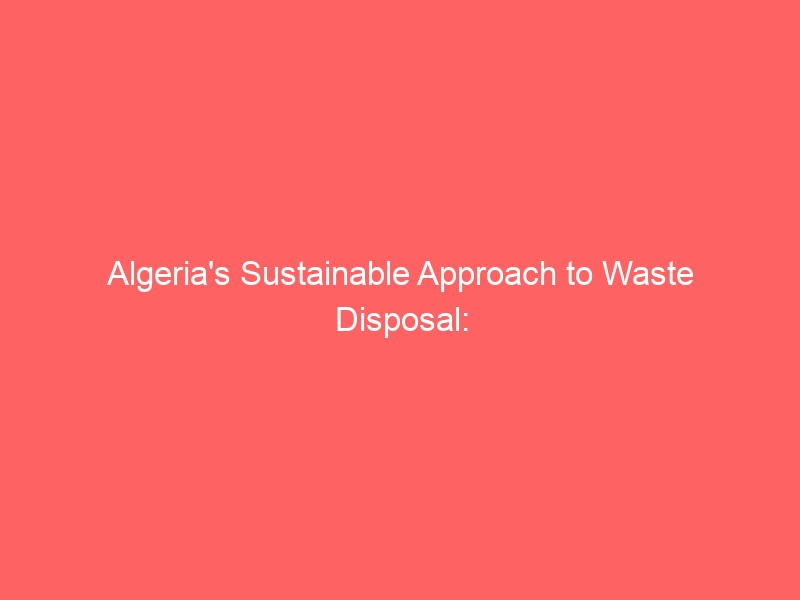Algeria, like many other countries around the world, faces significant challenges when it comes to waste disposal. With a rapidly growing population and urbanization, the amount of waste generated by the country has increased substantially over the past few decades. This has led to a pressing need for sustainable and efficient waste disposal solutions.
One approach that Algeria has been increasingly adopting is the use of incinerators to dispose of solid waste. Incineration is a process that involves the combustion of waste materials to produce heat, steam, and electricity. This method has been recognized as an effective and environmentally friendly way to manage waste and also to generate energy.
Algeria has been actively investing in the installation of incinerators in various cities and towns across the country. These incinerators are equipped with state-of-the-art technology and are designed to meet strict emission standards to ensure minimal impact on the environment. In addition to waste disposal, these incinerators also help to generate electricity, reducing the country’s dependence on fossil fuels.
The Role of Incinerators in Sustainable Waste Disposal
Incinerators play a crucial role in addressing Algeria’s waste disposal challenges. These facilities help to reduce the volume of waste that ends up in landfills, minimizing the impact on the environment. Additionally, incineration of waste can help to generate energy, contributing to the country’s efforts to diversify its energy sources and promote sustainability.
One of the key benefits of incineration is its ability to handle a wide range of waste materials, including hazardous and non-hazardous waste. This makes incinerators a versatile and efficient solution for managing different types of waste generated by industries, households, and commercial establishments.
Furthermore, incineration can help to reduce the release of greenhouse gases and other pollutants into the atmosphere. Modern incinerators are equipped with advanced emission control systems that help to minimize air pollution and ensure that the process is as environmentally friendly as possible.
Algeria’s investment in incineration facilities also creates employment opportunities and stimulates economic growth. The construction and operation of incinerators require a skilled workforce, contributing to the development of the local economy and providing jobs for the community.
In addition to waste disposal and energy generation, incinerators also contribute to the overall sustainability of Algeria’s waste management system. By reducing the reliance on landfills and promoting the recovery of energy from waste, incinerators help to create a more circular economy, where resources are utilized efficiently and waste is minimized.
Frequently Asked Questions about Incineration and Waste Disposal in Algeria
Q: Are incinerators safe for the environment and public health?
A: Modern incinerators are equipped with advanced emission control systems that help to minimize the release of pollutants into the atmosphere. These facilities are designed to meet strict environmental standards and are regularly monitored to ensure compliance with regulations. Properly operated and maintained incinerators pose minimal risk to the environment and public health.
Q: What types of waste can be incinerated?
A: Incinerators can handle a wide range of waste materials, including municipal solid waste, industrial waste, medical waste, and hazardous waste. The design and operation of incinerators are tailored to accommodate different types of waste and ensure safe and efficient combustion.
Q: How does incineration contribute to energy generation?
A: Incineration produces heat, which can be used to generate steam and electricity. Many modern incinerators are equipped with energy recovery systems that capture the heat generated during the combustion process and convert it into usable energy. This helps to reduce the reliance on fossil fuels and promotes a more sustainable approach to energy generation.
Q: What is the government doing to promote sustainable waste disposal in Algeria?
A: The Algerian government has been actively investing in the development of incineration facilities and other sustainable waste management solutions. This includes the implementation of policies and regulations that encourage the adoption of environmentally friendly waste disposal methods and the promotion of public awareness and education on waste management and recycling.
Q: How can individuals and businesses contribute to sustainable waste disposal?
A: Individuals and businesses can play a key role in promoting sustainable waste disposal by reducing, reusing, and recycling waste materials. This includes minimizing the use of single-use plastics, separating recyclable materials from non-recyclables, and properly disposing of hazardous waste. By adopting responsible waste management practices, everyone can contribute to creating a cleaner and healthier environment for future generations.
In conclusion, Algeria’s approach to waste disposal, particularly the use of incinerators, is a crucial step towards promoting sustainability and mitigating the environmental impact of waste generation. By investing in modern incineration facilities and promoting responsible waste management practices, Algeria is making significant strides towards achieving a more sustainable and environmentally friendly waste disposal system. With ongoing efforts and investment in sustainable waste management solutions, Algeria is well-positioned to address its waste disposal challenges in a responsible and effective manner.
Algeria’s Sustainable Approach to Waste Disposal: The Role of Incinerators




